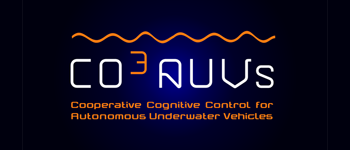
Co3 AUVs
Cooperative Cognitive Control for Autonomous Underwater Vehicles
| Project Information | |
|---|---|
| Funding Agency | EU FP7 |
| My Role | Researcher |
| Project Website | http://www.co3-auvs.org |
| Duration | February 2009 to January 2012 |
| Coordinator | Jacobs University Bremen gGmbH, Germany |
| Partners | Jacobs University Bremen gGmbH, Germany |
| Universita degli Studi di Genova, Italy | |
| Graal Tech SRL, Italy | |
| Instituto Superior Tecnico, Lisbon, Portugal | |
| Universita di Pisa, Italy | |
| Universita del Salento, Italy | |
| Universita degli Studi di Cassino e del Lazio Meridonale, Italy | |
My role in the project
As a researcher working on 2D/3D multi-robot simultaneous localization and mapping (SLAM), I was able to publish several papers and give a number of conference talks. I was also responsible for the development of the custom underwater simulator and the hardware integration of and driver development for several underwater sensors used with our underwater robot. I co-organized two project summer schools and gave lectures on the topics of high-fidelity multi-robot simulations and multi-robot SLAM.
Additionally, I spent two weeks visiting the Dynamic Systems and Ocean Robotics (DSOR) group of Prof. Antonio Pascoal within the Institute for Systems and Robotics at the Instituto Superior Tecnico Lisbon, where I gave a talk about my ongoing research within the institute’s seminar series.
Executive Summary
The Co3AUVs project focused on novel methods for underwater multi-robot systems. Three main pillars were investigated: 3D perception and mapping, distributed (formation) control, and multi-vehicle planning.
See also the project entry on Cordis.
Video - Custom Simulator
Video - Path Following in Formation
Project Objectives
Autonomous Underwater Vehicles (AUVs) represent one of the most challenging frontiers for robotics research. AUVs work in an unstructured environment and face unique perception, decision, control and communications difficulties. Currently, the state of the art is dominated by single AUVs limited to open-sea preplanned trajectories with offline postprocessing of the data gathered during the mission. The use of multiple AUVs as propagated in this project is still in a very early research phase. Some of the research issues addressed in this project are even completely uncharted territory, especially the development of functionalities to seamlessly monitor critical underwater infrastructures and to detect anomalous situations (e.g., missions related to harbour safety and security) and the study of advanced AUVs capable of interacting with humans to perform such functions as companion/support platforms during scientific and commercial dives. The aim of the Co3-AUVs project is to develop, implement and test advanced cognitive systems for coordination and cooperative control of multiple AUVs. Several aspects will be investigated including 3D perception and mapping, cooperative situation awareness, deliberation and navigation as well as behavioral control strictly linked with the underwater communication challenges. As a result, the team of AUVs will cooperate in challenging scenarios in the execution of missions where all data is online processed. In doing so, the team will be robust with respect to failures and environmental changes. These key features will be tested in a harbor scenario where additional difficulties with respect to open sea applications arise and in a human diver assistance scenario that also illustrates human robot interaction issues.